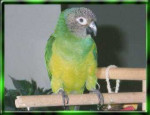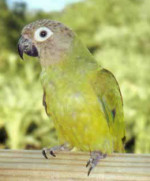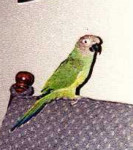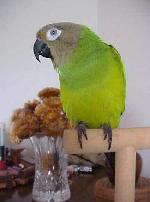Welcome to the
Dusky-Headed Page!
|
Name: Chile |
Name: Dusty |
Name: Dusty (aka: Screech) |
|
Name: Java
|
Name: |
Name:
|
Name: Dusky-Headed Conure (Aratinga Weddellii)
Description: Generally green with a greenish-yellow abdomen. The head is a greyish-brown. Each feather is edged a dull blue. The upper breast is an olive-green. The first primaries are black with a blue edge with the remainder being green with bluish edging on the ends of the outer webs. The upperside of the tail is blue with a green base and the underside is blackish. Skin to the very wide Periophthalmic Ring is white with the bare cere a reddish-grey. The Iris is a pale yellow. Immatures have generally duller plumage with the Iris being dark. The beak is black and the feet are grey. Average length is 28 cm (11.0 inches). Immatures have a generally duller plumage and a dark Iris. All Conures are not sexually dimorphic and must be DNA or surgically sexed.**
In The Wild: Lives in pairs or groups of 3 to 8 birds with occasional flocks of 75 to 100 birds when sufficient food is available. Prefers river bank areas along rivers and marshy areas. They are very quiet when feeding and mostly make sound only during flight. Their call is similar to the White-Eyed Conure (Aratinga Leucophthalmus) but is more refined and sharper.
Breeding Information: This is a very avid breeder--No fixed breeding time. A clutch usually consists of 3 to 5 eggs with an incubation period of 23 days and a fledging period of 50 days. Three breedings a year are possible, but no more than that should be allowed. Their eggs measure 27.0 x 23.0 mm (1.06 x 0.91 inches).
Temperament: Medium-noisy Conure. Calls mostly when excited. They are wary and usually accept their owner very slowly. Duskys are known to be hard chewers and it is recommended that you provide fresh green branches every day. Once they are acclimatised they are very hardy. They enjoy bathing.**
Diet: This should consist of Pellets, a good Seed Mix (Safflower, Oats, Paddy Rice, some Sunflower--also sprouted--Canary Seed and various Millets), lots of Fruits and Vegetables (particularly carrots and apples), and Greens. White bread, rusk and biscuit for rearing. Diets may vary so you should consult your Avian Veterinarian.
** (Please note that not all birds are the same and may vary somewhat in Temperament and Plumage.)
Created by Rio
Designs
Champaign, Illinois



